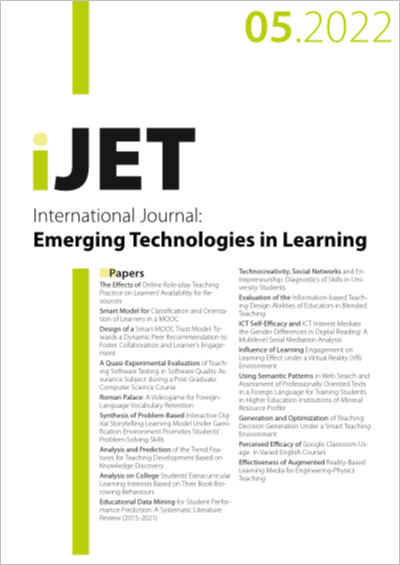Influence of Learning Engagement on Learning Effect under a Virtual Reality (VR) Environment
DOI:
https://doi.org/10.3991/ijet.v17i05.29451Keywords:
virtual reality (VR), learning engagement, learning effect, mediating effectAbstract
Abstract—In this study, the differences generated by the scenario resources under a virtual reality (VR) environment to the learning effect and learning engagement were explored. Next, the influences of learning engagement (including emotional engagement and cognitive engagement) on the immediate test performance and the one-week-later test performance were tested. Finally, the mediating role played by the VR technology in the facilitating effect of learning engagement on the learning effect was analyzed. Results reveal that the emotional engagement (3.366) and cognitive engagement (3.854) in the experimental group under the VR environment are higher than those (3.325 and 3.618, respectively) in the control group. The difference between the control group and experimental group in the aspect of immediate test performance is significant at the 0.01 level (t=−3.388, p=0.002), and the same significance level is manifested in the aspect of one-week-later test performance (t=-3.126, p=0.003). Whether VR-based teaching was adopted plays a complete mediating role in the influences of cognitive engagement on the immediate test performance and the one-week-later test performance, but it does not play any mediating role in the influences of emotional engagement on the immediate test performance and the one-week-later test performance. The conclusions have important reference values for giving full play to VR-based teaching design, encouraging front-line teachers to participate in customizing VR-based immersive teaching resources, optimizing the VR learning contents highlighting emotional elements, and designing multichannel perceived knowledge contexts.
Downloads
Published
How to Cite
Issue
Section
License
Copyright (c) 2022 LinSheng Wang (Submitter); YouYang Xin

This work is licensed under a Creative Commons Attribution 4.0 International License.



